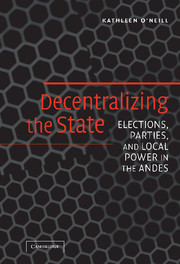6 - Ecuador, Peru, and Venezuela
Published online by Cambridge University Press: 02 December 2009
Summary
Introduction
Colombia and Bolivia, despite extremely different party systems, levels of economic development, and experiences with democratic rule, both managed to decentralize in the last twenty years. Ecuador, Venezuela, and Peru add richness to this analysis by broadening the range of country experiences with national- and subnational-level power-sharing arrangements. Ecuador, a country whose parties experience wide swings in election results over time, provides the one example of a country that does not decentralize significantly during this time. Venezuela, although it has a long history of extremely strong and stable parties and a long experience of democratic rule, decentralizes late and only partially. Peru provides the single example of a country where power has not only been decentralized, but also recentralized during democratic rule.
This chapter analyzes whether the pattern discerned in previous chapters fits the experiences of these three countries. More specifically, it seeks to determine whether decentralization occurs during periods when the party in power is uncertain of its chances in national elections, gains strong support at subnational levels, and has a fairly steady level of support across time periods. Parties that fit this profile are expected to support decentralization because it offers them an opportunity to win a large proportion of positions contested through subnational elections when they are unsure of retaining power at the national level. Large changes in support for parties across elections frustrates a party's ability to predict its electoral prospects, shortening its time horizons and diminishing the appeal of decentralization's long-term electoral benefits.
- Type
- Chapter
- Information
- Decentralizing the StateElections, Parties, and Local Power in the Andes, pp. 160 - 204Publisher: Cambridge University PressPrint publication year: 2005



